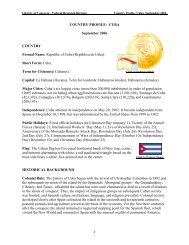1 - American Memory
1 - American Memory
1 - American Memory
You also want an ePaper? Increase the reach of your titles
YUMPU automatically turns print PDFs into web optimized ePapers that Google loves.
213<br />
second major source of income, are expected to level off or drop next<br />
year.<br />
All of these factors are having a decided impact on our thousands<br />
of small enterprises, and creating unemployment and uncertainty. If<br />
we should be subjected to any significant interruption of our lifeline<br />
next year or the year after that, the economic impact will surely be<br />
severe—but I fear the psychological impact upon business and con-<br />
sumer alike will be long-lasting and will destroy the confidence of resi-<br />
dents and prospective investors. People cannot live in constant fear of<br />
running out of salt and toilet paper and rice, or out of fear of being<br />
laid off because the basic materials needed to perform their jobs can t<br />
reach them.<br />
There is no other <strong>American</strong> State that would condone such isolation<br />
from the necessities of life and of employment. When 80 percent or<br />
more of your vita] needs are cut off, you do not have time to come<br />
running to Congress for special relief; you do not have time to wait for<br />
the impact to spread to several other States so the President may de-<br />
clare a national or regional emergency. The merchants begin to panic<br />
a whole month before a contract expiration. The consumers begin to<br />
panic about 2 weeks before a contract expires. And the tension be-<br />
comes severe on the day of the walkout. No matter the assurances of<br />
business that supplies on hand are adequate for at least 45 days for<br />
nonperishables, the hoarding begins. The instinct of self-preservation<br />
is demonstrated to its fullest without shame.<br />
Mr. Chairman, the people of Hawaii want only to be given the same<br />
consideration that people in other States receive when there is a major<br />
transportation interruption. They are convinced that no area on the<br />
U.S. mainland could be cut off so completely and for so long from so<br />
much of its needs without early intervention by the Congress or the<br />
Executive. But what hurts us does not hurt adjoining States—we are<br />
all alone with the narrowest part of our border measuring 2,400 miles<br />
thick.<br />
We firmly believe that Representatives Matsunaga and Mink have<br />
propounded a reasonable bill in H.R. 7189—one that should be ac-<br />
ceptable to all parties concerned, one that will by no stretch of the<br />
imagination break a strike nor interfere in the continuation of the<br />
collective bargaining process. In fact, Mr. Chairman, the passage of<br />
this bill will remove from the parties on the west coast the pressures<br />
we usually place on the White House of immediate Taft-Hartley in-<br />
junctions. We are the only ones screaming for help at the earliest<br />
stages of a west coast strike or lockout, the people on the west coast<br />
are usually unaware of any effects from such longshore and maritime<br />
disputes.<br />
There is already evidence that enactment of H.R. 7189 into law<br />
would measurably help to reduce the cost of doing business in Hawaii<br />
and lielp to ease consumer prices.<br />
Just as significantly, it would ease our tensions and restore our con-<br />
fidence and make people elsewhere less fearful of doing business ^vith<br />
us. Today, just a little over 15 years since statehood, the people of<br />
Hawaii want full equality of treatment afforded all other States. The<br />
B7-S4B O - '< •



![Albert Einstein Papers [finding aid]. Library of Congress. [PDF ...](https://img.yumpu.com/21604228/1/190x245/albert-einstein-papers-finding-aid-library-of-congress-pdf-.jpg?quality=85)





![American Colony in Jerusalem Collection [finding aid]. Library of ...](https://img.yumpu.com/17941275/1/190x245/american-colony-in-jerusalem-collection-finding-aid-library-of-.jpg?quality=85)



![Piccard Family Papers [finding aid]. - American Memory - Library of ...](https://img.yumpu.com/17941234/1/190x245/piccard-family-papers-finding-aid-american-memory-library-of-.jpg?quality=85)


